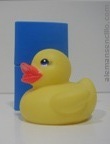Prepositions in German
Prepositions are used as a union between a noun, verb or adjective with another noun, verb, adjective or adverb.
The use of one preposition determines the case used for nouns, articles, adjectives and pronouns.
| Accusative | Accusative/Dative | Dative | Genitive |
| bis durch für gegen ohne um wider | an auf hinter in neben über unter vor zwischen | ab aus außer bei entgegen entsprechend mit nach seit von zu | anstatt aufgrund außerhalb dank statt während wegen |
Prepositions with Accusative
bis
- until (LOCATIVE or TEMPORAL)
bis bald
(see you soon)bis in den Tod
von Kopf bis Fuß
(from head to toe)
durch
- by means of, through (LOCATIVE)
Eine Reise durch Deutschland
(a trip through Germany)Wir fahren durch den Fluss
(we are driving through the river)
(Expressions):
10 [geteilt] durch 5 ist gleich 2
(10 divided by 5 is 2)
Used in the construction of the passive voice:
Google wird durch Werbung finanziert
(Google is financed by advertisements)
Important verbs followed by the preposition durch:
waten durch
(to wade through)
für
- for (PURPOSE)
sterben für dich
(to die for you) - of (PURPOSE)
Institut für Allgemeine Physik
(Institute of General Physics)
Contractions: fürs (für + das)
Important verbs followed by the preposition für:
- abstellen für
(to send to) - adaptieren für
(to adapt to/for) - agitieren für
(to campaign for) - Geld ausgeben für
(to spend money for) - bürgen für
(to vouch for) - einstehen für
(to be responsible for something) - sich entscheiden für
(to decide on) - entschuldigen für
(to apologize for) - interessieren für
(to be interested in) - sorgen für
(to take care of something) - vertauschen für
(to change for)
gegen
- against (LOCAL)
Kampf gegen den Krebs
(the fight against cancer)gegen die Wand
(against the wall) - toward, about, approximately (TEMPORAL)
Er kommt gegen 9.00 ins Büro
(He’s coming to the office at 9:00) [approximately]
Important verbs followed by the preposition gegen:
- abdichten gegen
(to seal against) - abhärten gegen
(to strengthen against) - abschirmen gegen
(to protect against) - agitieren gegen
(to campaign against) - protestieren gegen
(to protest against)
ohne
- Welt ohne Krieg
(a world without war)
um
- at (TEMPORAL)
um zehn Uhr
(at ten o'clock)um ein Haar(very nearly)
- at, around (LOCAL)
um die Ecke
(around the corner)
Important verbs followed by the preposition um:
- bitten um
(to ask for/ to request) - kümmern um
(to care for)
wider
- against
Er handelt wider das Gesetz
(He is acting against the law)Wider Erwarten kam der Gast doch noch
(Against all expectations, the guest arrived)
Prepositions with Dative
ab
- starting at/on (TIME)
ab dem 24. Februar
(starting on the 24th of February) - from (PLACE, ORIGIN)
Wir fliegen ab Köln
(we fly from Cologne)
aus
- from (PLACE, origin)
Wein aus Italien
(Wine from Italy)Ich komme aus Spanien
(I come from Spain)Wir kommen aus der Stadt
(We come from the city) - from, out of (MATERIAL)
Tisch aus Holz
(Table out of wood)
Important verbs followed by the preposition aus:
- auswählen aus
(select from) - bestehen aus
(consists of, to be composed of) - ableiten aus
(to derive from) - kommen aus
(to come from) - vertreiben aus
(to expel from)
außer
- without
Außer der Liebe nichts
(Nothing else besides love)Wir sprechen alles außer Hochdeutsch
(We speak everything except high German) - (expressions)
außer Betrieb
(out of service)
bei
- next to, near to (PLACE)
Die Schule ist bei der Apotheke
(the school is next to the pharmacy) - in, with, at
Ich arbeite bei Porsche
(I work at Porsche)bei Montage
(during assembly)
Contractions: beim (bei + dem)
Main article: preposition bei
entgegen
- against, contrary to
entgegen allen Erwartungen
(contrary to all expectations) - (expressions)
entgegen dem Uhrzeigersinn
(counter-clockwise)
entsprechend
- according to
entsprechend dieser Regel
(according to this rule)den Umständen entsprechend
(according to the circumstances)
mit
- with (MODAL)
Spiel mit mir
(Play with me)Er reist mit dem Fahrrad
(He’s traveling with his bike)
Important verbs followed by the preposition mit:
- ausrüsten mit
(to equip with) - beginnen mit
(to begin with) - eindecken mit
(to supply with) - hantieren mit
(to be busy with, to temper with) - multiplizieren mit
(to multiply by) - protzen mit
(to make a show of) - rechnen mit
(to count on, reckon) - reden mit
(to talk with) - sprechen mit
(to speak with) - teilen mit
(to share with) - sich treffen mit
(to meet with) - zusammenhängen mit
(to be related with)
nach
- to, toward (LOCATIVE)
Sie geht nach Berlin
(She’s going to Berlin)- nach is used for cities or countries that don’t have an article
- Expression: nach Hause ([I’m going] home)
- to (LOCATIVE)
nach links
(to the left) - after (TEMPORAL)
Sie studiert nach der Arbeit
(She studies after work)
Main article: preposition nach
seit
- since (TEMPORAL)
Besucher seit 2008
(visitors since 2008)
von
- from, of (LOCATIVE OR TEMPORAL)
das Lied von der Erde
(the song from the Earth)
Contractions: vom (von + dem)
Important verbs followed by the preposition von:
- abbringen von
(to dissuade from) - abhängen von
(to depend on) - ablassen von
(to desist from) - abschreiben von
(to copy from) - abweichen von
(to deviate from) - entbinden von
(to absolve from) - zurücktreten von
(to resign from/ to back out of)
Used in the construction of the passive voice:
Google wurde von 2 Mathematikern gemacht
(Google was made by 2 mathematicians)
zu
- towards
er kommt zu mir
(he is coming to me)"Zu" is used with the meaning of to
- when we are heading to a person or a specific place (with a name) - on, at, to
Er kommt zu Fuß
(He’s coming on foot)Übergang zu der Demokratie
(Transition to democracy) - (EXPRESSIONS)
Ich bleibe zu Hause
(I stay at home)Der Weg zum Meer
(The way to the sea)Informationen zu Italien
(Information on Italy)
Contractions: zum (zu + dem), zur (zu + der)
Main article: preposition zu
Prepositions with Genitive
anstatt
- instead of
Ich will anstatt der Pommes lieber mehr Salat
(I want more salad instead of French fries)
aufgrund
- due to, based on
Diskriminierung aufgrund des Glaubens
(Discrimination due to beliefs)
außerhalb
- outside of, out of
Außerhalb des Bereichs
(Out of the area)
dank
- thanks to
Dank deines Tipps hat es geklappt
(It worked thanks to your tip)
statt
- instead of
Sie gab ihren Schmuck statt des Gelds
(She gave her jewelry instead of the money)
während
- during
Während des Jahres 2008
(During 2008)
wegen
- because of, due to
Wegen eines Fehlers
(Due to a mistake)
Important verbs followed by the preposition wegen:
- zerstreiten wegen
(to quarrel because of)
Prepositions with Accusative/Dative
They are also called "Wechselpräpositionen". They are accusative if they indicate movement and dative if they indicate a state (of rest).
There are some verbs that always indicate movement and other that always indicate a state of rest.
| Verbs of movement (regular and transitive) | Verbs of state (irregular and intransitive) |
an
- on, in, next to
Wenn ich an deiner Stelle wäre, würde ich ...
(If I were in your position, I would...) - (EXPRESSIONS)
Am Sonntag
(On Sunday)Am Abend
(in the evening)
Contractions: am (an + dem), ans (an + das)
Main Article: preposition 'an'

auf
- in, about, on
Contractions: aufs (auf + das)
Important verbs with auf:
- absetzen auf
(to set down on) - achten auf
(to pay attention to) - achtgeben auf
(to look out for) - anstoßen auf
(to toast for) - antworten auf
(to reply to) - ausweisen auf
(to expel from) - sich freuen auf
(to be happy about) - warten auf
(to wait for) - zielen auf
(to aim for) - zuschießen auf
(to hurdle toward)
Main article: preposition auf
hinter
- behind
Gehen Sie bitte hinter das Haus
(Please go behind the house)

in
- in, inside
Important verbs followed by the preposition in:
- einbauen in
(to insert into) - einbinden in
(to include in) - sich verlieben in
(to fall in love with) - versunken in
(to engulfed in) - zerteilen in
(to divide into)
Contractions: im (in + dem), ins (in + das)
Main article: preposition in
neben
- next to, near
über
- over, about, on top of (but without contact)
Important verbs followed by the preposition "über":
- nachdenken über
(to think about) - reden über
(to talk about)
unter
- under
Die Ente liegt unter dem Tisch
(The duck is under the table)

vor
- in front of
Sie wartet vor der Schule
(She is waiting in front of the school) - ago
Ich bin vor vier Jahren nach Deutschland gekommen
(I arrived in Germany four years ago)

zwischen
- between
Ein Vertrag zwischen Vatikan und der Freien und Hansestadt Hamburg
(A contract between the Vatican and the free and Hanseatic city of Hamburg)
Next Lessons:
home > : Pronouns | Nouns | Plurals | Diminutives | Verbs | Conjugation | Passive | Irregular verbs | Modal Verbs | Separable verbs | Reflexive verbs | Reciprocal verbs | Impersonal verbs | Conjunctions | Articles | Adverbs | Konjunktionaladverbien | Adjective | Comparative and superlative | Word order in German | Negation and Affirmation | Interrogation | Indirect question | Subordinates | relative clauses | Conditional clauses | Comma
Suggestions to Help You | Difficulties with learning German | Greetings